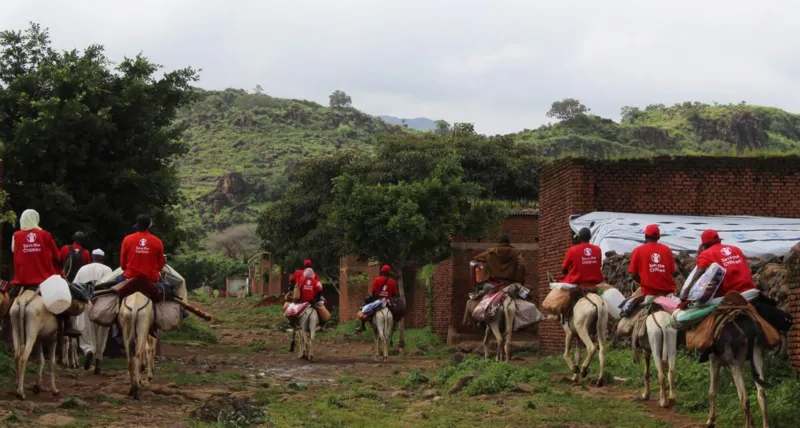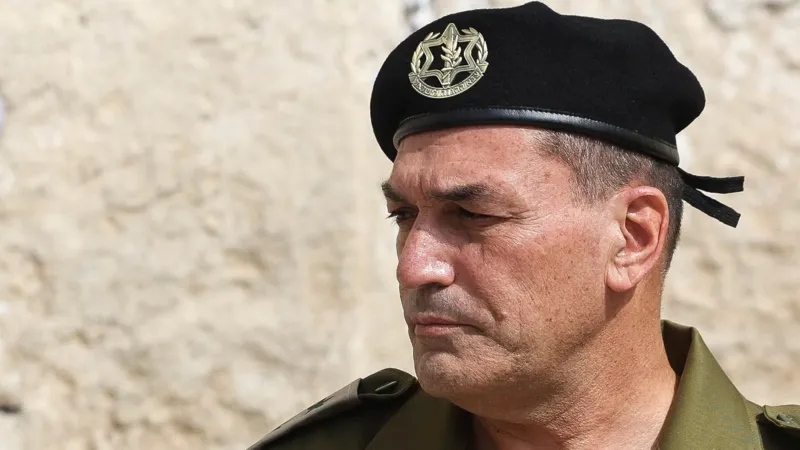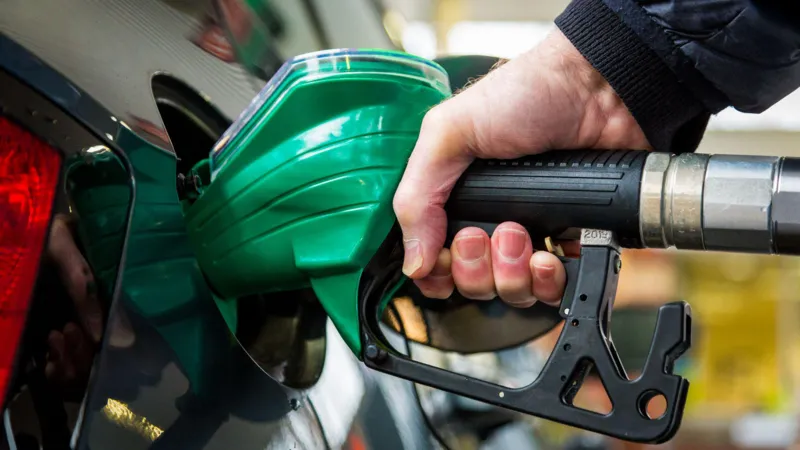Can Atiku Abubakar succeed in sixth run for Nigerian presidency?
In his sixth run for the Nigerian presidency, Atiku Abubakar is preaching a future as productive as the country’s past when he was vice president. Can he succeed?

Atiku Abubakar, Nigeria’s main opposition party’s presidential candidate, has always had an appetite for big battles.
During his tenure as Nigeria’s vice president between 1999 and 2007, Abubakar opposed the wave of adoption of Islamic law across parts of the country’s Muslim-majority north, the highest-profile Muslim politician from the region to do so.
He also backed opposition to a bill to amend the constitution and elongate the tenure of then-President Olusegun Obasanjo – a move that would scuttle Abubakar’s ambition to succeed his boss.
“He was seen as divisive and disruptive during his time as Obasanjo’s vice president, constantly seeking to carve a larger role for the office,” Ikemesit Effiong, head of research at SBM Intelligence, a Lagos-based geopolitical risk advisory consultancy, told Al Jazeera.
This month, Abubakar will be fighting the biggest battle of his political career: to succeed Muhammadu Buhari, whose second four-year presidential term ends this year.
It is the 76-year-old’s record sixth attempt to occupy the highest office in the land, with three of his previous losses coming at primaries.
“We have never been this divided along a number of fault lines either north, south or Muslim and Christian,” the People’s Democratic Party (PDP) candidate, whose slogan is “unifier”, said on the campaign trail this month. “I am going to give every part of this country a sense of belonging.”
If elected on February 25, a tough job awaits Abubakar.
Apart from dealing with Boko Haram’s 13-year armed campaign in the northeast, he would have to tackle growing insecurity as multiple armed groups operate across the country, including secessionists in the southeast and gangs of bandits elsewhere in northwest and central Nigeria.
Africa’s largest economy is also in a deep funk, having two recessions in five years, partly due to policy missteps and the fallout of the COVID-19 pandemic.
As many as 133 million Nigerians – the population of France and the United Kingdom combined – live in poverty. The naira is now 460 to the US dollar at official rates, almost four times worse than its value when Abubakar left office in 2007.
During the Obasanjo years, Nigeria notably secured $18bn in debt relief – half of its burden at the time – from the Paris Club in 2005. Two-thirds of its revenue is currently going towards repaying its debt, which could reach $172bn this year.
Abubakar, who headed the national economic council under an administration responsible for Nigeria’s highest gross domestic product (GDP) increase since its civil war ended in 1970, sees himself as the perfect candidate to bring back the glorious past many are aching for.
His experience in public service and as a successful businessman in agriculture, oil and education for decades has prepared him for the rough days ahead, Abubakar insists.
He has promised to set aside $10bn “to empower women and young men in business” as well as ensure fiscal federalism and devolution of powers to the states. Tackling insecurity is top of his agenda, too.
His critics, however, allege that Abubakar has always had an appetite for corruption too, from his time as deputy chief of customs in the 1980s. They say a privatisation exercise in the 2000s led to national assets ending up with his cronies.
In 2006, the Federal Bureau of Investigation raided Abubakar’s home in Maryland, United States for evidence related to his alleged bribing by William Jefferson, a congressman, in exchange for help with contracts in Nigeria. It remains unclear if anything was found or if money did indeed change hands. But three years later, a US court handed Jefferson a 13-year sentence over his role in the case.
This January, Abubakar addressed allegations of corruption against him, saying he was prepared to disclose his assets if compelled by law to do so.
“All corrupt practices or corrupt allegations against me have been investigated in this country more than anybody else and nothing was found against me,” he said in a recent interview.
A final act
In a country where politicians move across party lines frequently, Abubakar, now back in the PDP, has a history with the other leading contenders.
His former associate Bola Tinubu, who almost ran with him on a joint ticket in the 2007 presidential election according to WikiLeaks memos, will be on the ballot for the ruling All Progressives Congress (APC). Both men were founding fathers of the party.
Tinubu’s campaign has also been beset by corruption allegations, an age-falsifying scandal and resurfacing of documents related to his forfeiture of $460,000 to the US in a 1993 drug trafficking case. But he is still seen as the candidate to beat.
Meanwhile, multiple polls are projecting the Labour Party’s Peter Obi, former governor of Anambra in the southeast, whom Abubakar selected as running mate in 2019 and who still refers to him as “my elder brother”, as the tentative winner of the election.
There is also Rabiu Kwankwaso, who is running on the platform of the newly-formed New Nigeria People’s Party (NNDP) and has emerged as a wildcard in the presidential contest. In the 1990s, he and Abubakar were part of the People’s Democratic Movement (PDM), a political caucus.
But Abubakar, who is often referred to by his first name, also has to deal with realigning forces in Nigeria’s political establishment.
In August 2018, Obasanjo who previously linked his former deputy to the misappropriation of a $20m fund while in office, had famously quipped, “If I support Atiku for anything, God will not forgive me.”
Two months later, the two men reconciled. Obasanjo endorsed Abubakar who, however, lost the vote in 2019 to Buhari. This time, Obasanjo has shifted allegiance, endorsing Obi instead.
Analysts also say the former vice president has walked a tightrope for decades, trying to keep his northern base but also win followers elsewhere. Consequently, the relatively more progressive south sees him as a liberal northerner but the more conservative north has disliked him for the same reason.
Abubakar was never seen as “an exciting or galvanising force” and often came up against formidable, mostly northern candidates, including Buhari who is not on the ballot this time, Effiong said.
The situation may be changing.
Abubakar has been positioning himself as the “candidate of the north” in recent rallies in the region, Idayat Hassan, director of Abuja-based think tank CDD, told Al Jazeera.
“Atiku has been trying to build bridges … his campaign is beginning to gain currency, particularly in northwest Nigeria which is the region you really have to win, to win this election,” she said.
The region is the most populous of Nigeria’s six geopolitical zones, accounting for almost a quarter of the country’s 96.2 million registered voters.
The PDP has however lost its place as the de facto opposition party in parts of the south and north, as the Labour Party and NNPP ranks swell with supporters.
Within the PDP, there are fissures; for instance, the G5 – a group of governors across the south – have pledged to back other candidates. Their stated complaint is that a northerner did not get the ticket in accordance with an unwritten rule in Nigeria; the presidency is usually rotated between the predominantly Christian south and the majority-Muslim north in a nation almost split evenly between both religions.
Abubakar and Buhari are both Muslim from the north and members of the Fulani ethnic group.
Abubakar named another PDP governor, Delta’s Ifeanyi Okowa, as his running mate, a Christian, could amass votes in his state and elsewhere in the south apart from Tinubu’s stronghold – the southwest.
But some within the political landscape and business community see him as the candidate with the widest national spread of followers and a safer bet for the establishment than Obi with his radical cost-cutting proposals, the lesser-known Kwankwaso or the ailing Tinubu, 70.
“He is the likeliest of the top contenders to get the constitutionally required 25 percent of votes in two-thirds of the Nigerian states while not winning the outright majority,” said SBM Intelligence, in a research note. “This may work in his favour in the very event of a run-off, but we do not think he can take victory in the first round of the vote.”
Should a run-off happen, supporters of Obi and Kwankwaso could see Abubakar as the lesser of two evils if their candidates do not proceed to the second round, analysts say.
This may indeed be the final chance for him to move from supporting cast to lead character but the situation remains tricky.
“He’s running on the ticket of the main opposition party in an election where the ruling party is in a historically weak position with a nominee who is not very well-liked outside his home region,” Effiong said. “But for the historic rise of a credible third-party candidate, this would probably be his election to lose.”
-al jazeera







